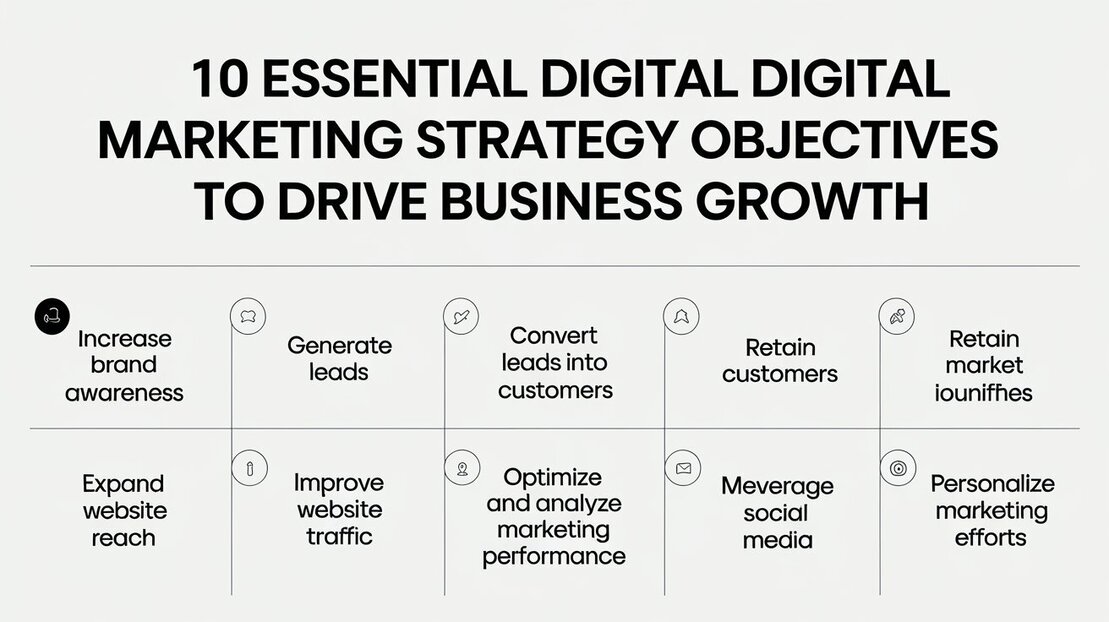Introduction

1. Increase Brand Awareness
Building brand awareness is one of the most critical digital marketing strategy objectives. By leveraging social media marketing, content marketing, and paid advertising, businesses can improve visibility and establish trust among their target audience.
How to Achieve This Objective:
Utilize social media platforms like Facebook, Instagram, and LinkedIn to engage with potential customers.
Create valuable and shareable content, such as blogs, videos, and infographics.
Invest in pay-per-click (PPC) advertising to reach a wider audience.
2. Improve Search Engine Rankings
Search engine optimization (SEO) plays a vital role in enhancing online visibility. Businesses must optimize their websites to rank higher in search results and attract organic traffic.
SEO Best Practices:
Conduct keyword research and integrate relevant terms.
Optimize on-page elements like meta titles, descriptions, and header tags.
Build high-quality backlinks to improve domain authority.
3. Generate Quality Leads
Lead generation is one of the most important digital marketing strategy objectives for businesses looking to convert visitors into customers.
Strategies to Generate Leads:
Offer valuable lead magnets such as free eBooks, webinars, or templates.
Implement email marketing campaigns to nurture prospects.
Use call-to-action (CTA) buttons effectively on landing pages.
4. Boost Customer Engagement
Engaging with customers builds long-term relationships and increases brand loyalty. Interactive content and personalized marketing campaigns can enhance engagement.
Ways to Boost Engagement:
Use chatbots and AI-driven customer support.
Personalize email marketing messages.
Encourage user-generated content and customer reviews.
5. Increase Website Traffic
Driving more traffic to your website is essential for achieving other digital marketing strategy objectives such as lead generation and sales conversion.
How to Increase Traffic:
Leverage content marketing through blogs and guest posts.
Run targeted social media ad campaigns.
Optimize website speed and user experience (UX).
6. Enhance Conversion Rates
A well-optimized marketing funnel ensures that visitors take the desired action, such as making a purchase or signing up for a service.
Conversion Optimization Tips:
Use A/B testing to refine marketing messages and landing pages.
Optimize CTA buttons for better visibility and action.
Implement retargeting strategies to re-engage potential customers.
7. Strengthen Social Media Presence
A strong social media presence helps businesses connect with their audience and build brand authority.
Social Media Strategies:
Post consistently and at optimal times.
Engage with followers through comments, polls, and live sessions.
Collaborate with influencers to expand reach.
8. Maximize Customer Retention
Retaining existing customers is more cost-effective than acquiring new ones. Businesses should focus on building lasting relationships.
Customer Retention Strategies:
Offer loyalty programs and discounts for repeat customers.
Provide excellent customer service and support.
Regularly update customers with personalized offers and content.
9. Leverage Data-Driven Marketing
Data analytics enables businesses to make informed decisions and optimize marketing strategies.
Data-Driven Marketing Tactics:
Use Google Analytics to track website performance.
Monitor social media metrics to understand audience behavior.
Apply customer segmentation for targeted campaigns.
10. Increase Revenue and ROI
Ultimately, the goal of any digital marketing strategy objective is to generate revenue and improve return on investment (ROI).
Ways to Boost ROI:
Focus on high-converting marketing channels.
Optimize advertising budgets for better performance.
Continuously test and refine marketing campaigns.
Conclusion
Implementing these ten digital marketing strategy objectives will help businesses enhance brand visibility, drive traffic, improve engagement, and increase revenue. A well-planned digital marketing strategy, backed by data and continuous optimization, can lead to long-term business success.

